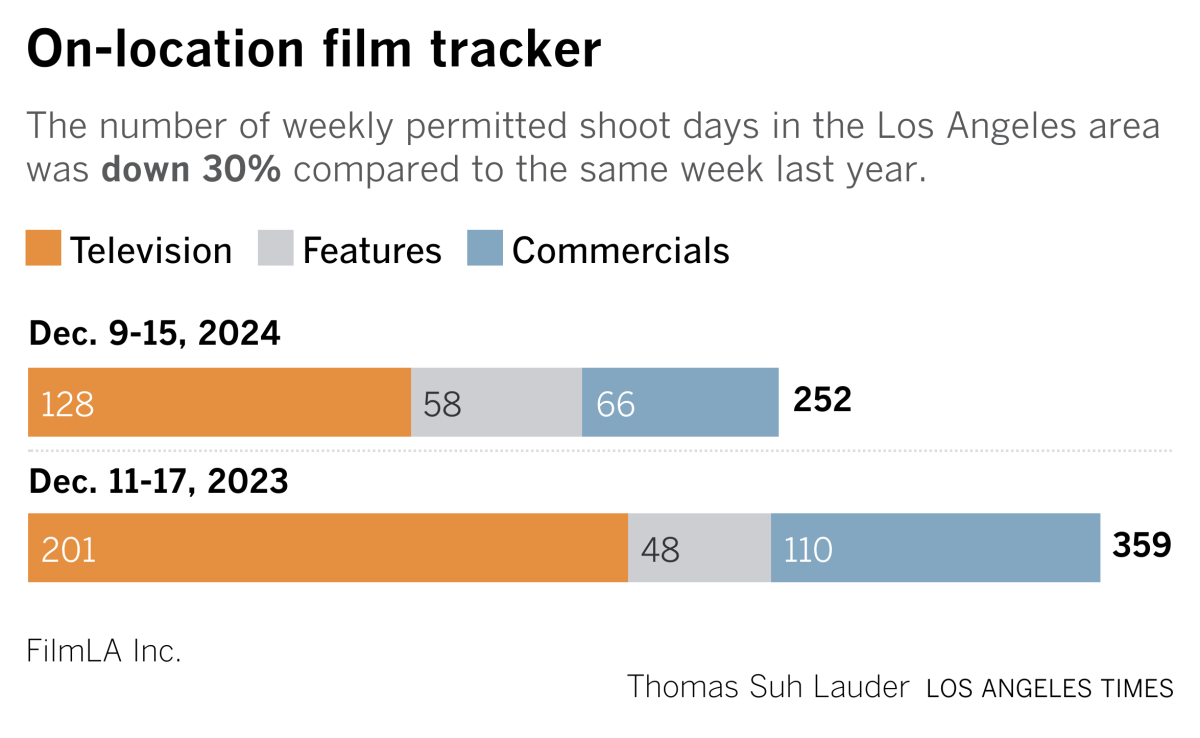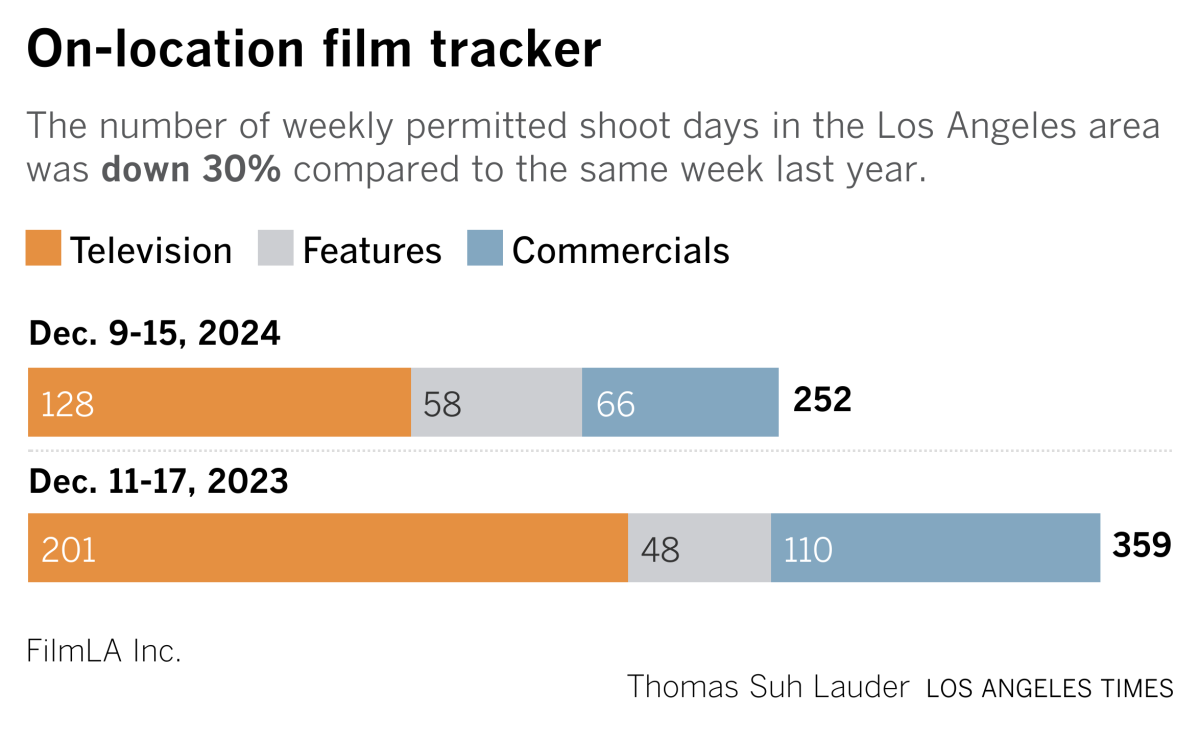There were plenty of things that went wrong for Hollywood in the year 2024. There were box office flops (sorry, “Joker: Folie à Deux” and “Kraven the Hunter”), mass layoffs, continued labor unrest and a stunning lack of employment in the production space due to a broad contraction in the media and entertainment sector.
But not everything, or everyone, failed. This week, we highlight the people, institutions and ideas that came out on top. (We’ll be back in a week or so to review the low-lights of 2024.)
Disney gets its mojo back
Bob Iger came into 2024 with a challenging hand — a low stock price, a money-losing streaming business, a renewed proxy campaign from a prominent investor and a movie slate with (gasp) only one Marvel Studios film. But while Disney is not fully in the clear yet, the company has emerged much stronger than many people expected.
Iger decisively beat the onslaught from Nelson Peltz and his hard-charging allies. The movie studio, which had a wobbly track record during the post-pandemic years, scored two $1-billion hits — “Inside Out 2” and “Deadpool and Wolverine” — and other big performers including “Moana 2” and “Alien: Romulus.” The stock is up more than 25% since the beginning of the year. Cable programmer and Hulu supplier FX dominated the TV awards season with “Shōgun” and “The Bear.” And those streaming services? They’ve started turning quarterly profits, when all put together.
Yeah, sure, you might say. But serious questions remain in Disney’s comeback story. For example, how will ESPN’s upcoming flagship streaming service fare when it launches next year?
And here’s the big one: Who’s going to replace Iger when he steps down for good this time? Will it be one of the four division heads: TV chair Dana Walden, parks boss Josh D’Amaro, ESPN head Jimmy Pitaro or film czar Alan Bergman? Or an outsider? With James P. Gorman (Morgan Stanley‘s outgoing executive chairman) leading the succession process, Disney is hoping this transfer of power is less dramatic than previous rounds.
We’ll see in due time, as the company has set early 2026 as its target for making its selection.
David Ellison conquers the mountain
The deal almost fell apart, but after so much wrangling, Paramount Global will soon have a new chief: David Ellison, the son of Oracle Corp. billionaire Larry Ellison.
The task of fixing all that broke at Paramount under the Redstone family won’t be easy. Years of chronic under-investment won’t be overcome immediately, no matter how much techno know-how Ellison and his team bring to the famed Paramount movie studio, CBS, a second-tier streaming service and a collection of faltering cable networks. Cost cutting has already come and discussions about restructuring and leadership changes are underway.
Paramount has franchises like “Sonic the Hedgehog,” “Top Gun” and the Taylor Sheridan universe, but it needs more, and it needs to do more with what it has, according to Ellison and his private equity backers at RedBird. Easier said than done. But the industry is ready to give Ellison a chance. After all, he’s a movie guy.
This clearly won’t be the last of the big studio deals. Analysts expect more consolidation as cable channels continue to lose power, especially with the Trump administration anticipated to be more favorable to mergers and acquisitions than the Biden White House.
The movie musical makes a comeback
No one mourns the wicked, and no one should fear the movie musical. Universal Pictures and Jon M. Chu’s big-screen rendering of the Broadway smash “Wicked” has made hundreds of millions of dollars at the box office (mostly in the U.S.) and instantly catapulted Ariana Grande and Cynthia Erivo into the Oscar race. “Part Two,” now titled “Wicked: For Good,” comes out next year.
The movie musical is a tradition as old as Hollywood itself, but the genre had come on hard times in recent years, thanks to flops such as “Cats,” “Dear Evan Hansen” and “The Color Purple.” Despite the success of movies such as “Wonka” and “The Greatest Showman,” studios seemed nervous to advertise the musical elements of their song-and-dance extravaganzas. Well, no need this time. If anyone went into “Wicked” not knowing it was a musical, that’s on them.
Studios should know musicals aren’t a turn-off for audiences, especially if fans are already obsessed with the soundtrack. That level of familiarity is what helped propel the record-breaking box office opening weekend of “Moana 2.” (Animation has been a true bright spot for the movie business, with the “Inside Out” sequel, “Despicable Me 4” and “The Wild Robot”).
Funnily enough, “Wicked” isn’t the only musical in the awards conversation. Netflix’s big contender is the operatic “Emilia Pérez,” a boundary-pushing festival darling that received mostly positive reviews but a tepid response from streaming audiences.
Politicians doing podcast interviews and nonpolitical media appearances is not a new phenomenon. The latter is a tradition going back to Richard Nixon going on “Laugh-In” and Bill Clinton playing the sax on “The Arsenio Hall Show.”
But for President-elect Donald Trump’s campaign, sitting for long, friendly podcast interviews wasn’t just part of the Republican presidential candidate’s media strategy. It was the strategy. Trump talked at length to Joe Rogan, Theo Von and the “Flagrant” guys Andrew Schulz and Akaash Singh, all to target their loyal audience of young men. Trump did this while avoiding traditional outlets like “60 Minutes,” which he sued over how it edited its interview with his opponent.
Vice President Kamala Harris’ failed campaign also used podcasts like Alex Cooper’s “Call Her Daddy,” while still doing more standard TV appearances. Hindsight suggests her interview on “The View,” in which she couldn’t say what she would’ve done differently from President Biden, might’ve done more harm than good.
The biggest takeaway? The declining relevance of legacy news media as a force that can shape public opinion — a consequence of declining viewership and historically low trust in mainstream institutions.
Studios bet on theaters
After the misbegotten straight-to-streaming experiments of the pandemic era, studios have for the most part bought into the viability of movie theaters again. In one case, a studio did so literally.
Sony Pictures this year acquired Alamo Drafthouse, the quirky cinephile-focused chain devoted to special screenings, themed menu items and a strict no-texting policy. The move was widely seen as a validation of the theatrical business model, though overall domestic box office is still down significantly from pre-COVID-19 times (the annual total is expected to be lower than last year’s).
Theaters still pine for the days when moviegoing was more of a regular habit for Americans. These days, “event” cinema, streaming competition, shorter theatrical windows and high prices have made trips to the theater more of a special occasion than a casual every-weekend experience. But despite clear challenges, the largest theater operators are investing in improvements to their locations ahead of what’s expected to be a chock-full slate in 2025 and 2026.
Though Apple has backed off its theatrical ambitions after a spate of flops, others have gone in the opposite direction. At next year’s CinemaCon movie theater convention in Las Vegas, Amazon MGM Studios will present its slate for the first time. Sony will return to the Colosseum stage after taking last year off. The movie business isn’t the dominant force in entertainment that it once was, but it remains an important part of studios’ strategies.
The Oscars were good again, briefly
For all the justified doomsaying over awards shows being increasingly out of touch the general public, it’s worth noting that this year’s Oscars gave its highest honor to a genuine blockbuster, “Oppenheimer,” while also giving out multiple awards to the hilariously weird “Poor Things.” That, and a relatively embarrassment-free telecast, is about as good as one can expect from the Academy Awards.
Did it make much of a difference from a business perspective? Kind of. Ratings were up a modest 4% to 19.5 million viewers, the highest number since 2020 (the lowest of low bars). There’s just no getting around the overall decline in TV viewership for three-hour awards shows.
Next year’s ceremony could be even tougher, given the odd state of the best picture race, which has no clear front-runner and appears likely to be dominated by a handful of film festival favorites. “Wicked” is in the race, but is a “Part One” really a serious best picture contender? “Anora” and “Conclave” are excellent movies, but they’re not going to make for must-see TV. It’s an odd year.
Streaming bundles and price hikes
Streaming got more expensive in 2024. That’s not ideal for customers who turned to direct-to-consumer services as a cheap alternative to the cable and satellite bundle. In the latest example, YouTube TV announced a plan to raise its monthly fee by 14%, sparking online backlash from users. No wonder the free Tubi is taking off. But for media, entertainment and tech companies, it’s a necessary step, and it seems to be working.
At the same time, companies are trying to prevent cancellations by offering discounted bundles. Disney+ has added Hulu and ESPN+ content to make the service more of a must-have for a wider range of people. Walt Disney Co. also took the perhaps inevitable step of offering a bundle with a rival, launching a subscription package of Disney+, Hulu and Warner Bros. Discovery’s Max for $17 a month with ads.
Research from Antenna suggests that bundles are effective in reducing churn. The cancellation rates for the Disney bundle have been consistently lower than for the individual services. On the less successful front, a federal judge blocked Disney, Fox and Warner Bros. Discovery’s proposed sports streaming offering Venu on antitrust grounds. But there’s little doubt that the future of streaming is higher prices and more combinations.
Newsletter
You’re reading the Wide Shot
Ryan Faughnder delivers the latest news, analysis and insights on everything from streaming wars to production — and what it all means for the future.
You may occasionally receive promotional content from the Los Angeles Times.
Stuff we wrote
Warner Bros. Discovery restructures as cable struggles, setting stage for deals. Investors cheered the news that Warner Bros. Discovery planned to separate its cable channels, except for HBO, into a separate unit.
Writers Guild demands studios stop tech companies from training AI on their work. The Writers Guild of America sent a letter to Hollywood studios including Disney, Sony and Netflix, asking them to take action against tech companies who are using writers’ work to train AI.
Animation Guild board defends contract deal as some members critique AI terms. Three members of the Animation Guild’s negotiation committee say they oppose the tentative contract that the union reached with major studios over terms governing artificial intelligence.
Rupert Murdoch cannot hand control of his media empire to son Lachlan, commissioner rules. Conservative media titan Rupert Murdoch cannot change his family trust and give control to his son Lachlan after his death, according to a Nevada probate commissioner ruling.
MSNBC ratings collapse postelection, Fox News surges as cable faces an uncertain future. Viewers have fled left-leaning MSNBC since Vice President Kamala Harris lost the general election to former President Trump on Nov. 5. The audience for the Comcast-owned channel is down 46% compared to the first 10 months of 2024.
ICYMI:
Security contractor can seek damages from CNN
Kanye West’s private school hit with default judgment
BuzzFeed sells ‘Hot Ones’ unit for $82.5 million
Virgin Music Group acquires Downtown Music Holdings
ABC agrees to $15-million Trump settlement payment
Film shoots
On-location production was down compared to the same week last year, according to FilmLA.

Finally …
“Somebody Somewhere” quietly became one of HBO’s non-dragon-related gems since it first premiered. The third and final season is terrific. Separately, I happened to watch Robert Eggers’ new “Nosferatu” and Coralie Fargeat’s “The Substance” in the same week, and I regret nothing. And if you haven’t seen Fargeat’s earlier film “Revenge,” it’s definitely worth a watch.
